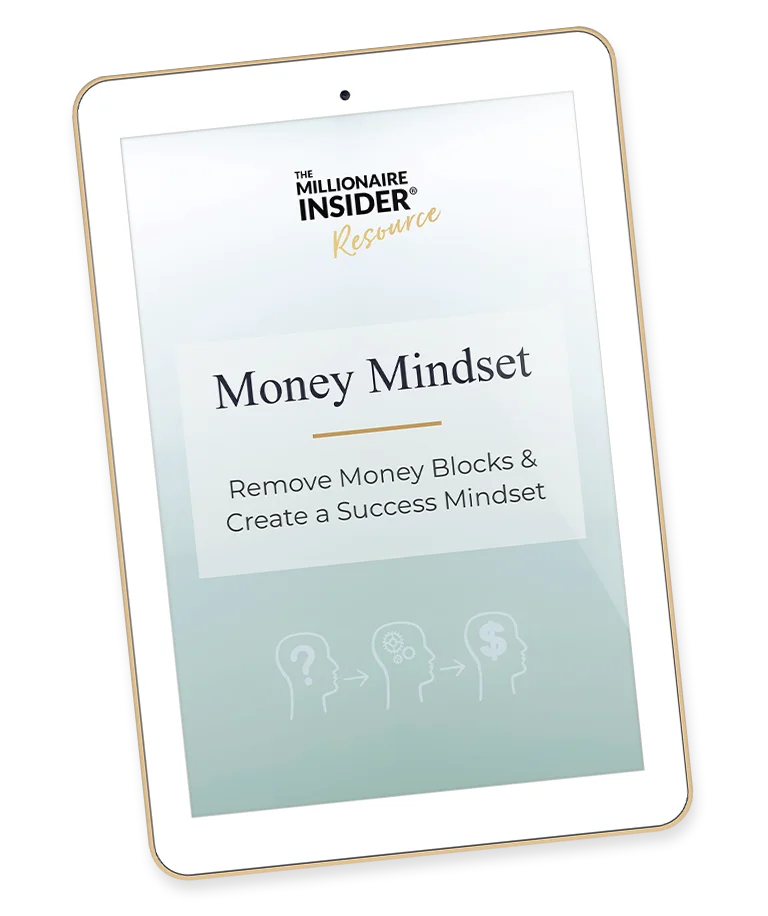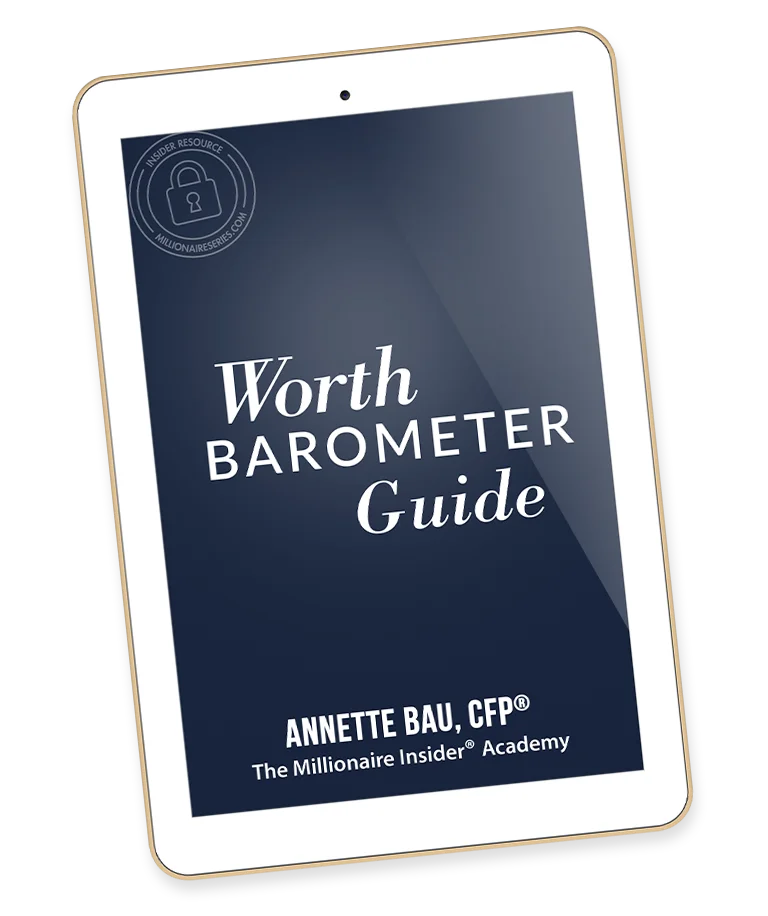Updated November 24th, 2023.
Today in Reducing Anxiety with Money and in Life, you will learn:
- What is anxiety?
- Understanding anxiety
- Different forms of anxiety
- Self-help strategies
Introduction – Reducing Anxiety: How Money Impacts Anxiety and Ways to Relieve It
Anxiety is a common reaction that affects millions of people worldwide.
There are a variety of ways it can show up. Examples may include:
- Feeling anxious or worried
- Negative thoughts
- Increased heart rate
- Paralysis that impacts your entire life
While anxiety can stem from various sources, one factor that significantly influences it is money. Financial stress and worrying about money can make anxiety worse. Today, you will learn insight into the relationship between money and anxiety and effective ways to relieve stress.
Disclosure
All materials and intellectual property are copyrighted by MillionaireSeries.com®.
This information is for educational purposes only. It is not intended to replace any advisor or specialist or provide any investment, financial, tax, retirement, planning, or healthcare advice.
By reading this, you agree to hold MillionaireSeries.com® and its affiliates harmless for results achieved or not achieved.
Understanding Anxiety
Anxiety is a natural response to a perceived physical or mental threat. Worry and fear often cause anxiety.
It’s a normal reaction to stress and can be helpful in situations where danger is present. In such cases, anxiety can trigger the “fight or flight” response, preparing the body to react to a threat. However, when stress becomes excessive or chronic, it can interfere with daily life and overall mental and physical health.
Understanding the Relationship of Money and Anxiety
The relationship between money and anxiety is complex. For some, financial stability can reduce anxiety. Others find that with additional wealth comes more stress. 
Financial Stress
One of the most direct ways money impacts anxiety is through financial stress.
Examples include:
- Struggling to make ends meet
- Facing overwhelming debt
- Worrying about job security for you or your children
- Fear of not having adequate income to support your family
All these challenges can lead to anxiety and even fear about your and your family’s future.
Different Forms of Anxiety
Anxiety can manifest in various forms, each with its unique characteristics and triggers. Here are some common types of anxiety disorders:
Generalized Anxiety Disorder (GAD)
People with this disorder excessively worry about situations.
Often, this extreme worry is worse than the situation warrants. People with GAD often experience physical symptoms like restlessness and muscle tension.
Social Anxiety Disorder
Social anxiety, or social phobia, is an intense fear of social situations and judgment by others. People with social anxiety may avoid social interactions, public speaking, or even eating in public.
Panic Disorder

Panic disorder causes repeated experiences of intense fear or anxiety. Some people experience physical symptoms, like shortness of breath and chest pain, referred to as panic attacks. These attacks can be terrifying, leading to a fear of having more panic attacks in the future.
Specific Phobias
Specific phobias involve an irrational fear of a particular object or situation, such as heights, flying, spiders, or needles. Exposure to the feared object or situation can lead to extreme anxiety and avoidance behavior.
Obsessive-Compulsive Disorder (OCD)
People refer to OCD as recurring and unwanted thoughts. These obsessions are repetitive.
A common obsessions is fear of germs. As a result, the person continually washes their hands.
Post-Traumatic Stress Disorder (PTSD)
PTSD can develop after a person experiences or witnesses a traumatic event. It is often triggered by reminders of the traumatic experience.
Symptoms may include:
- Flashbacks
- Nightmares
- Severe anxiety
Social Comparison
In our consumer-driven society, we often compare our financial status  to others. This can lead to low self-esteem when we perceive ourselves as falling short of societal expectations.
to others. This can lead to low self-esteem when we perceive ourselves as falling short of societal expectations.
Lifestyle Pressure
This entails trying to maintain a certain lifestyle. It can be due to societal pressure or personal desires.
Results often include:
- Financial strain
- Stress
- Marital problems
Economic Uncertainty
Economic downturns, job losses, and market fluctuations can increase general anxiety levels in the population. Uncertainty about the future can be a significant source of anxiety.
Effective Ways to Reduce Anxiety
Reducing anxiety in your life involves an approach that addresses both the emotional and practical aspects of this condition.
The first step in coping with anxiety is to understand it. Recognize the signs and symptoms and identify the triggers or situations that increase your stress. Professional support can help you better manage and reduce your anxiety.
Maintain a Healthy Lifestyle
Examples of a healthy lifestyle include:
- A balanced diet
- Regular exercise
- Sufficient sleep
- Limiting caffeine, alcohol, sugar, and gluten
- Removing toxic people from your life
Practice Relaxation Techniques

Relaxation techniques can calm the mind and relieve anxiety. For example, studies show that practicing mindfulness helps reduce anxiety. Simply closing your eyes and breathing in and out to the count of ten can reduce stress and anxiety.
Techniques for reducing anxiety include:
- Deep breathing
- Guided imagery
- Progressive muscle relaxation
- Meditation
- Yoga
- Chants
These techniques promote awareness of the present moment and lessen worries about the future.
Seek Professional Help
If your anxiety is interfering with your daily life, seek help from a mental health professional. Therapists, psychologists, and psychiatrists can provide support tailored to your specific needs.
Cognitive Behavioral Therapy (CBT)
CBT is an effective form of therapy for anxiety. It helps individuals identify and challenge irrational thoughts and beliefs that increase anxiety. CBT can provide long-term relief from stress by changing thought patterns and behaviors.
Medication
In some cases, medication may be necessary to manage anxiety. Medications can help alleviate symptoms. Many experts recommend using medicine with therapy for the best results. Always consult with a licensed practitioner. 
Financial Planning
If money-related stress is a significant factor, begin with these steps:
- Create a budget
- Reduce debt
- Save more money
Seeking financial advice from experts can help to ease your financial concerns.
Self-Help Strategies for Reducing Anxiety and Stress
There are several self-help strategies you can employ to manage anxiety.
Examples include:
Journaling
A journaling practice can relieve anxiety and help you clear your mind.
Journaling is a place to express your thoughts and feelings.
Establish a Routine
A structured daily routine can provide stability, reducing anxiety in the process.
Time Management
Setting realistic goals and creating a to-do list can help. When you know what to do, you often experience less stress and feel less overwhelmed.
Social Support
When needed, connect with friends and loved ones who can offer emotional support,  understanding, and a listening ear.
understanding, and a listening ear.
Physical Activity
Regular exercise releases endorphins. This is the body’s natural stress reliever.
Physical activity can also help reduce stress and improve your overall mental well-being.
Emotional Support
Share your feelings with friends and family who can provide emotional support. Sometimes, talking to someone you trust can alleviate anxiety considerably.
Stress Management
Develop healthy stress management techniques. Examples include:”
- Deep breathing exercises
- Yoga
- Journaling
- Hiking
- Meditation
Self-Care
Making self-care a priority is critical to living a fulfilled life. This includes getting enough sleep, maintaining a balanced diet, and engaging in hobbies or activities that bring joy.
Conclusion – Reducing Anxiety and Managing Stress

Anxiety is a prevalent and often challenging condition, with money being a significant influencer. While financial concerns can contribute to anxiety, it’s important to remember that various strategies can help alleviate it.
If you need help, seek professional help. Professionals can help you manage financial stress, adopt lifestyle changes, and improve your emotional well-being.
Reducing anxiety is possible and more accessible than you realize.
Understanding the relationship between anxiety with money and life is an important step. Then, you can take steps to manage stress to live a healthier, more balanced life.
Click here to get your free financial checkup:
Here is the link to watch today’s episode: “Reducing Anxiety and Managing Stress.”

